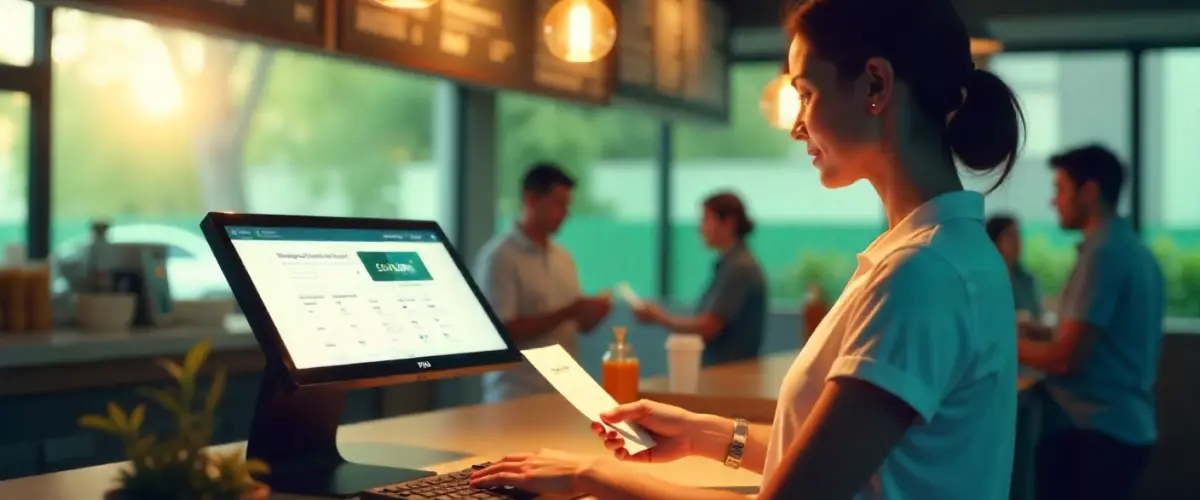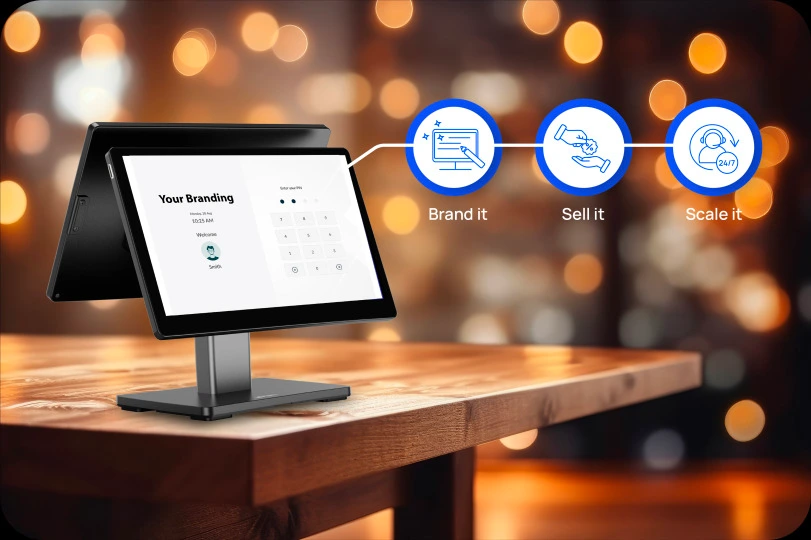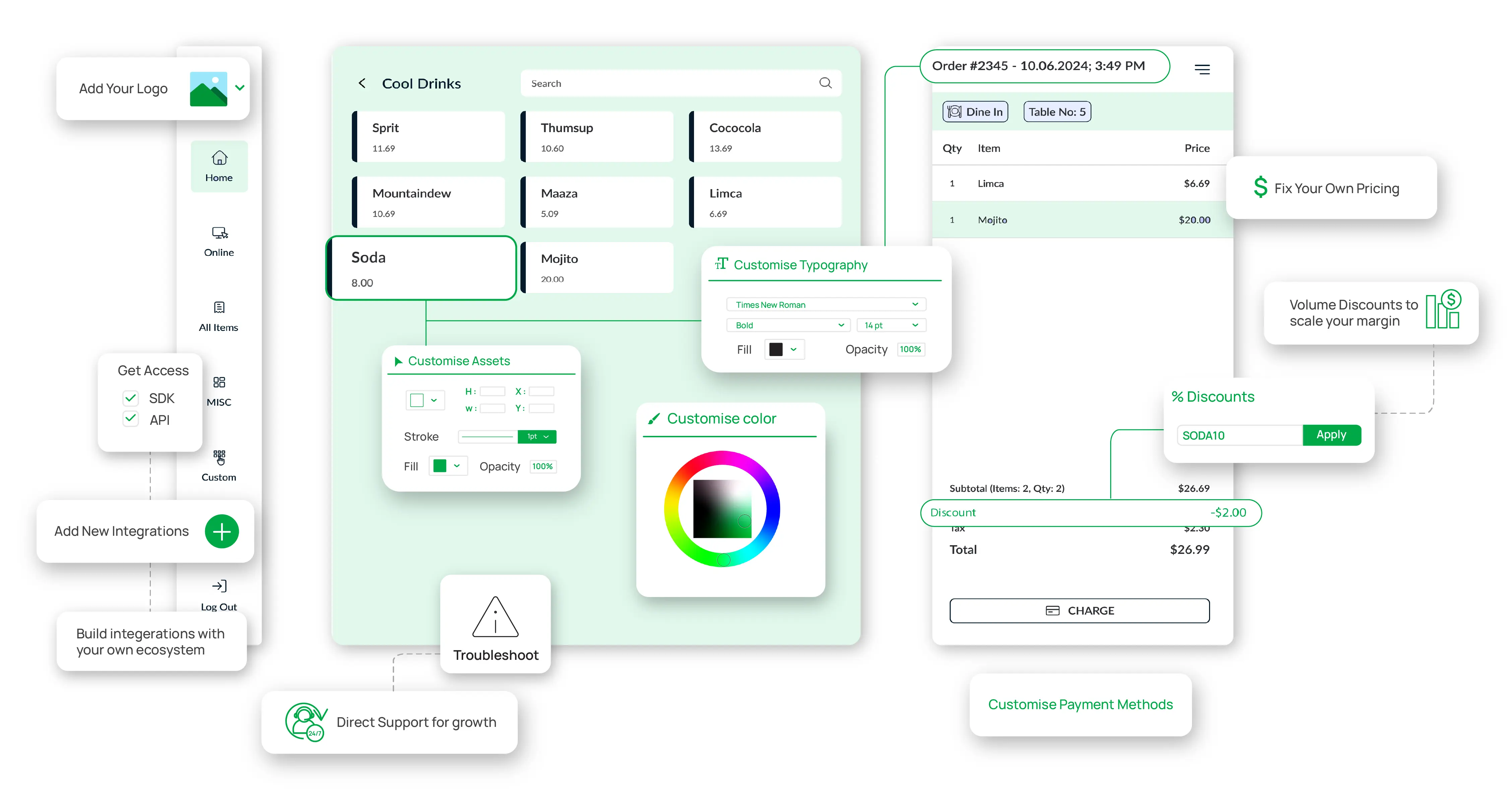Why White Label POS Is the Smarter Choice for Your Business in 2025

Running a small business like a restaurant, liquor store, or retail shop means juggling a hundred moving parts — staff, customers, inventory, and payments. At the center of it all is your POS system– to make your life easier. Period.
The problem? Most POS systems don’t. They are all rigid, expensive and rarely reflect your business’s identity.
The Problem With Most POS Systems
Most small businesses start with what’s readily available: a POS system bundled with a payment provider offered by a well-known vendor. These systems are quick to set up and take care of the basics like ringing up sales, processing payments, and printing receipts.
But they also come with built-in limitations:
- Your brand takes a backseat — the vendor’s name shows up on receipts, apps, and loyalty programs.
- Customization is minimal, so you end up bending your business to fit the software instead of the other way around.
- Scaling becomes painful as your needs change.
Some larger brands avoid this by building their own custom POS systems. That gives them control, but it also costs a fortune and takes months, or years, to develop. For most restaurants and liquor stores, that’s not a realistic option.
What Exactly Is a White Label POS System?
Think of a white label POS as the best of both worlds. It works right out of the box like a vendor-branded POS, but still gives you the flexibility of a custom system, without the high costs or long wait.

That means:
- Receipts that carry your logo, turning every transaction into a brand touchpoint.
- Customer screens in your colors, giving shoppers a seamless and consistent experience.
- Loyalty programs and promotions under your name, keeping customers connected to your business.
To your customers, it feels like your business built its own technology. Behind the scenes, it’s proven, reliable software designed to grow with you.
Why White Label POS Is Gaining Ground
Cloud-based POS systems have already become the norm. The next step is ownership — businesses want technology that feels like their own. That’s why more restaurants and liquor stores are choosing a white label POS in 2025. It combines:
- Speed and simplicity of vendor-branded POS.
- Control and flexibility of custom-built solutions.
- Pricing that actually works for small businesses.
With a white label POS, you don’t have to settle for cookie-cutter software or spend a fortune building your own.
White Label POS vs Vendor-branded POS vs Custom-built POS: A Quick Comparison
Real-World Impact
Restaurant chain boosts revenue by 25%
A multi-location restaurant chain rolled out a white label POS to unify operations and put its brand front and center. Within a year, the system drove a 25% increase in revenue, thanks to branded loyalty programs, centralized reporting, and a smoother customer experience that kept diners coming back.
Franchise network achieves 18% sales growth
A nationwide franchise network adopted a white label POS to maintain consistent branding and streamline day-to-day operations across all outlets. The result was an 18% jump in sales, with franchisees benefiting from both improved efficiency and stronger brand cohesion.
Retail group lifts repeat purchases by 20%
A retail group integrated a white label POS with customizable loyalty features and CRM tools. This upgrade created more personalized promotions and customer touchpoints, leading to a 20% boost in repeat purchases and measurable improvements in long-term customer engagement.
How to Pick the Right White Label POS?
Not every provider gives you the same level of control. Before choosing a white label POS, ask:
- Can I put my branding on every customer touchpoint?
- Does it integrate with tools I already use, like payments, accounting or delivery apps?
- How easy will onboarding and support be for my team?
- Are the costs transparent, with no hidden fees?
- Is there a roadmap for future features like kiosks, e-commerce, and advanced analytics?
A true white label POS should feel like it belongs entirely to your business.
Why OneHubPOS Works for Small Businesses
OneHubPOS was built with restaurants, liquor stores, and retail owners in mind. It gives you the speed of an off-the-shelf POS, the flexibility of a custom system, and the affordability that small businesses need.

- Brand-first setup: Your logo, colors, and receipts — not the vendor’s.
- Processor-agnostic: Works with any payment processor, giving you the freedom to choose what’s best for your business.
- Industry-specific solutions: Add-on any module including Loyalty programs, kiosks, online ordering, inventory management, cash management and more.
- Quick onboarding: Effective and hands-on training so your staff can hit the ground running.
- Future-ready: A product roadmap that refines every day tasks, gives more time on your hand, and keeps your data tracked.
- 24/7 support: Always-on assistance to keep your business running smoothly, anytime you need it.
🚀 Ready to experience it yourself? Book a free demo with OneHubPOS and launch your own branded POS in just a few days.
Frequently Asked Questions
Most POS systems carry the vendor’s brand and fixed features. A white label POS looks and feels like your own — it puts your brand front and center and scales with your needs.
Not really. In fact, a white label POS is often more cost-efficient for businesses with multiple outlets. With OneHubPOS, for example, you can either pay $50 per terminal or choose the flat annual white label fee of $50,000, which usually works out cheaper overall. On top of that, you get the added advantage of branding the entire system as your own.
No. White label POS systems like OneHubPOS are designed to be intuitive. Staff training usually takes just a few hours.
Yes. A good white label POS seamlessly integrates with accounting software, payment gateways, delivery apps, and CRMs.
You can launch in just a few days, compared to months or years for a custom built system.
Rajat is a growth marketing professional with a passion for creating content that drives engagement and measurable results. He specializes in turning insights into clear, actionable stories that help brands scale.


